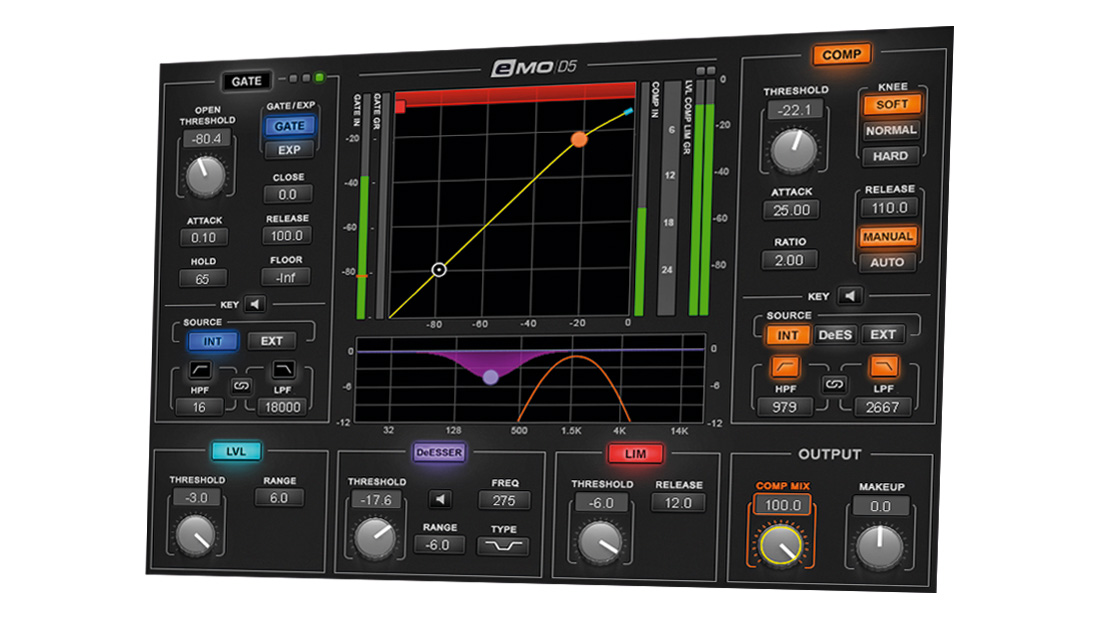MusicRadar Verdict
eMo D5 covers all dynamics bases with aplomb, from compression to de-essing, but at this price, you'd expect it to!
Pros
- +
Clean sound. Low CPU usage. Easy to use side chain filtering. Multimode DeEsser filter.
Cons
- -
No brickwall limiter on output. Only one makeup gain for whole plugin. Pretty expensive for what you get.
MusicRadar's got your back
eMo D5 combines five dynamics processors (DeEsser, Compressor, Limiter, Leveler and Gate/Expander) in a single plugin, claiming zero latency and light CPU usage.
It's the first plugin to incorporate Waves' 'Parallel Detection' technology, more on which later.
A clean, touchscreen-optimised interface makes it easy to dive in and get started, with the thresholds for the Gate, Limiter and Compressor adjustable directly in the central display, which also offers a combined gain reduction meter for the Compressor, Limiter and Leveler, and metering for the master output.
The Gate/Expander module will be familiar to users of Waves' C1 compressor/gate, with controls for Threshold, Attack, Release and Hold, as well as an independent setting for the Gate's closing threshold, plus a sidechain filter. The Expander gives more natural results than gating, as it doesn't completely mute the signal when it drops below the threshold.
The Leveler module acts as a slow-attack/slow-release compressor, aiming to maintain a consistent volume level over a long period of time for blanket compression of DJ mixes, voiceovers and the like. The Threshold setting controls both when the Leveler acts and its target level, with the Range spinner determining the maximum amount of gain reduction applied.
The DeEsser module is very straightforward, with controls for adjusting the Threshold, operating frequency (16Hz-21kHz) and strength of de-essing (Range). There's a choice of shelf, notch and bell filters, represented and adjusted in the graphical display; and the filtered sibilance can be soloed, making it easy to home in on it.
Next, the Limiter. This is another simple affair, offering just two controls: Threshold, setting the peak input signal level at which the limiter will act, and Release, dictating how long it takes for the signal to return to its nominal level.
Want all the hottest music and gear news, reviews, deals, features and more, direct to your inbox? Sign up here.
Finally, the Compressor has the usual Attack, Threshold and Ratio controls, with a choice of Manual or automatic Release - the latter isn't actually fully automatic but adjusts intelligently using the dialled-in Release setting as a guide. There's also a three-position Knee setting (Hard, Normal and Soft), a sidechain filter, plus a wet/ dry Comp Mix control for parallel compression.
Watching the detection
The Parallel Detection technology is less confusing than it sounds: instead of passing the signal along from one processor to the next, each module listens to the plugin's dry input signal, and the prospective gain changes of all five modules are then applied to it. This means that you can adjust the settings on any module without it influencing the response of the next module in the chain - because there is no chain!
eMo D5 is easy to use and capable of delivering solid results with a variety of source material. It delivers on the promises of zero latency and light CPU usage, and sounds transparent and uncoloured - although we did notice the compressor strangling the width of stereo signals a bit when pushed.
We're a bit surprised there's no brickwall limiting on the master output, but the Compressor and Gate's sidechain filter feature is a useful touch, while the flexible DeEsser is effective on more than just vocals, thanks to its broad frequency range.
While perhaps not one for master bus duties owing to its somewhat sterile, 'unmusical' sound, eMo D5 puts all the tools you need for everyday dynamics processing in a single, rather expensive plugin.
Computer Music magazine is the world’s best selling publication dedicated solely to making great music with your Mac or PC computer. Each issue it brings its lucky readers the best in cutting-edge tutorials, need-to-know, expert software reviews and even all the tools you actually need to make great music today, courtesy of our legendary CM Plugin Suite.

